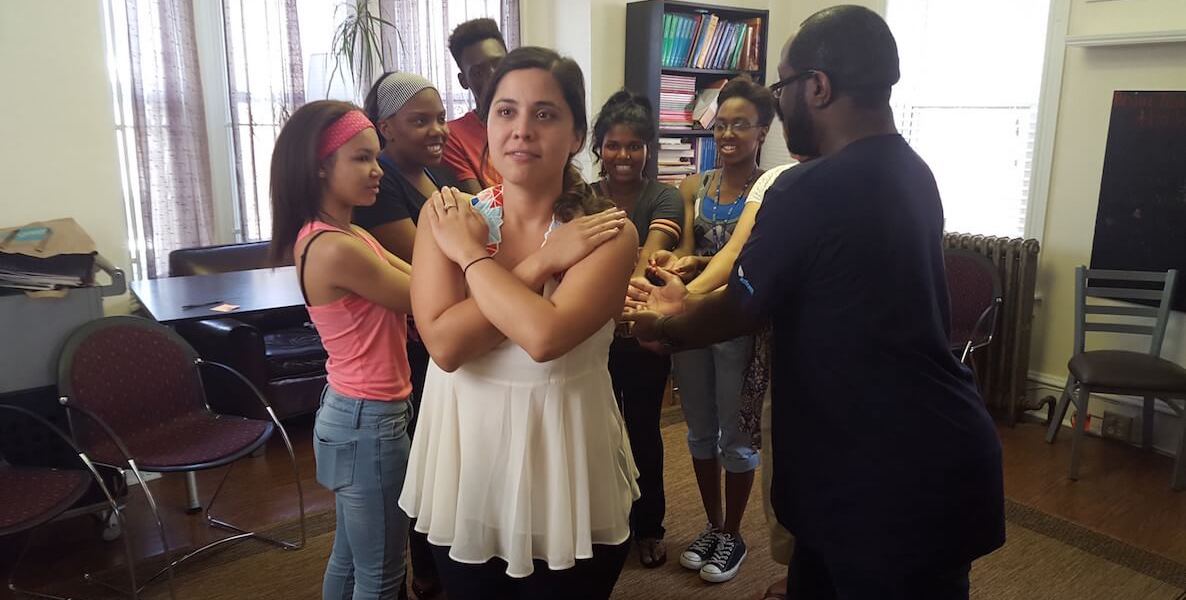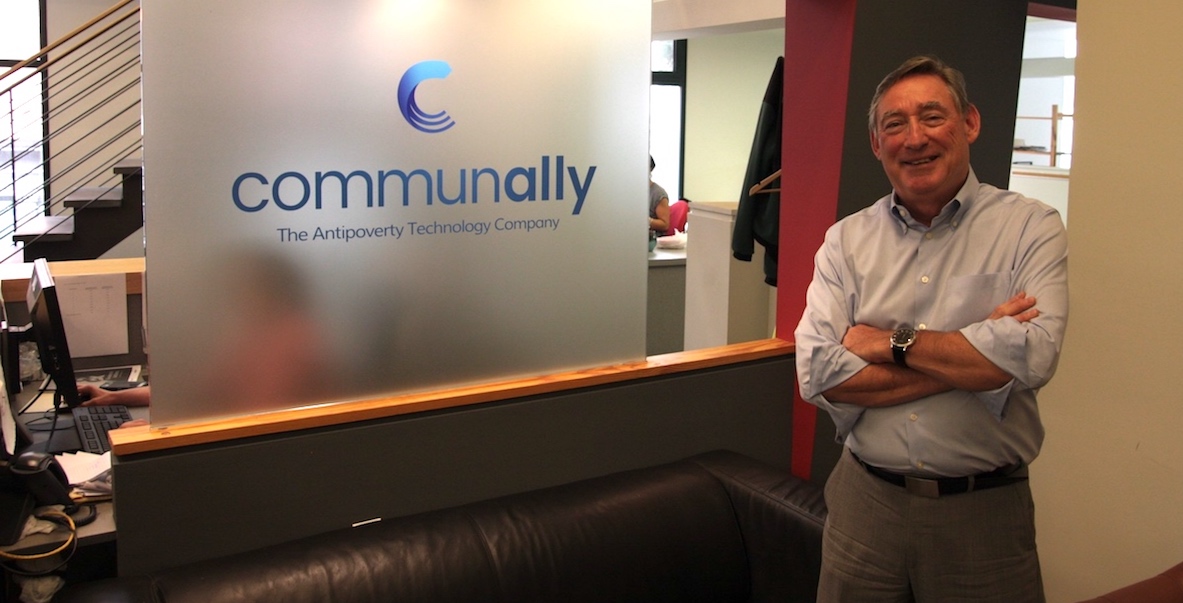Remember filing for student loans? I do. It was a nightmare, and I completely shanked it about twice. The student loan office was comically inept in trying to help me, a kid with virtually no organizational skills and zero financial education. Christopher Jacobs, the extremely British CEO of Communally, knows where I’m coming from.
“There’s a joke about FAFSA (Free Application for Federal Student Aid),” Jacobs says. “It’s easy, as long as you already have your doctorate.”
Jacobs should know. He’s dealt with FAFSA plenty, as well as virtually every other extant government benefit application, like food stamps, Medicaid and veteran’s assistance. As a matter of fact, that’s his whole shtick.
Be Part of the Solution
Become a Citizen member.Communally is a B Corporation, a company that uses the power of business to solve social and environmental problems, with a grand mission: Defeating poverty. To do so, it helps low-income folks with government paperwork and applications in an effort to ensure they get the most out of their tax and benefit filings, and helps them manage their money so they can get on the path to prosperity. According to Communally, the company so far has helped more than 1 million clients get over $2.5 billion in benefits and tax advantages.
Some 40 million Americans—including 400,000 Philadelphians—live in poverty, a condition that is generational, and can seem impossible to rise above. Communally helps people get out of crisis mode, into a place where they can start saving and planning, by offering the types of services usually reserved for people with money: financial advising and online and in-person tax prep. Only it offers it for free to people who need it most—low-income Americans, for whom a slight lift can mean the difference between eating and having a place to live, and not.
For example, Jacobs says, since 2010, more than 10 million people on average who are eligible for food stamps annually, don’t even apply. Some of this can be chalked up to the stigma of the application process—which in some states is rather breezy, and in others is goddamn draconian —but even more of it is due to the fact that applying for government benefits, on virtually any level, can be an incredibly difficult and opaque process that often requires multiple in-person appointments.
Communally helps cut through that confusion, with its web-based services and sometimes just as a matter of geography. In Columbus, Ohio, for example, Communally has 250 sites where counselors work with clients. The state and federal agencies have a few “supersites” around the city. “That doesn’t address the issue that with low income people, transportation is a fundamental problem,” Jacobs says. “How do I, a fairly typical mom with two kids, one of whom isn’t school age, schlep them to a city office with two bus changes? How do you make it accessible to the client? We look for ubiquity.”
Communally, which bills itself as an “anti-poverty technology company”, offers two main products: My BudgetCoach and The Benefit Bank. Through MyBudgetCoach, the business offers budget counseling that includes personal advice about managing finances, either in-person or online, in the form of monthly meetups. A recent University of Wisconsin-Madison study of 300 MyBudgetCoach clients found savings of almost $125,000, with around $75,000 in debt paid off.
The budget coaches are trained by and work for local community partners like hospitals, community colleges and social service agencies in 13 states, which pay Communally to license its software, and then provide the service to the clients for free.
But the Benefit Bank, launched in 2006, is Communally’s showstopper and raison d’etre. Think of the Benefit Bank as Quicken for lower-income folks that includes tax filing, filing for benefits and financial counseling. The program screens clients for eligibility and helps them apply for benefits that include student financial aid, disability, heating assistance and Medicaid. Through the Benefit Bank, clients can also file their state and local income taxes, paying special attention to tax breaks and benefits for low income filers that might otherwise be lost in the application.
In Philly alone, Communally has helped more than 47,000 household members get over $58.6 million in benefits.
Clients can use the self-serve option, in which they use the Communally software on their own, or work with a trained benefits coach at one of 6,000 partner locations. In some states, folks can use the Benefit Bank to apply for other benefits, like the dreaded FAFSA or veterans benefits. Communally’s software is available, for free, to individuals making less than $65,000 and families making less than $95,000.
Started in Philly in 1992, Communally—a combination of “community” and “ally”—was founded as a public policy consulting firm by Service Employees International Union staffers who wanted to remain in Philadelphia when the union moved its headquarters to Washington, DC; the staffers struck up a deal with SEIU to stay in Philly and do research and consulting work as an independent entity. The company was known as Solutions for Progress until earlier this year, when it changed its name. (Likely due to the unpleasant baggage after former Solutions for Progress CEO Robert Brand was convicted of funneling $600,000 through the company for corrupt Congressman Chaka Fattah.)
Originally catering to unions, Solutions for Progress spread its wings and began to do public policy consulting, including, Jacobs says, an early research paper on universal Medicare in Massachusetts. Jacobs, who joined the firm in the mid-2000’s as COO, says the company had its ‘come to Jesus’ moment in 2001, when they were consulting for a needleworkers union whose members were outliving their benefits.
About using technology to fight povertyRead More
After finding its dharma in helping people more easily apply for benefits, Communally became a B Corporation in 2012, and in 2013 became one of the first companies in Pennsylvania to formally register as a Public Benefit Corporation, which requires it to answer to its investors as well as to be socially and environmentally accountable to its community—something Jacobs has says fits the company’s mission and internal culture. In 2017, B Lab named Communally one of its Best for the World companies, and put it on its Best for Customers, Best for the Long Term and Changemakers lists.
Ralph Gildehaus, senior program director of MDC, a North Carolina non-profit that focuses on connecting North Carolinians with sustainable financial support and job training, says Communally’s software was especially vital during the recent financial crisis, when many clients lost their jobs. MDC used Benefit Bank to secure unknown benefits and tax breaks for many clients; some later used MyBudgetCoach to help figure out how to move forward. “Communally is the best technology for use by frontline, community-based organizations for connecting low-income households with help and income support,” says Gildehaus, who has worked with Communally since 2006, when he was director of the Ohio Benefit Bank.
Communally is a B Corporation with a grand mission: Defeating poverty.
The product, in action, is quick and precise in helping people find benefits. Jacobs remembers a snowy day in Little Rock, in 2012, when he was supervising a presentation on Communally in a homeless shelter. He says that it was the opening day of Section 8 housing, and folks in the shelter were scrambling to get the process moving. On the same day, a homeless couple with virtually nothing to their name appeared in the shelter.
“They were two elderly-looking people who, it turns out, had spent the night in their car, which had broken down. They were driving from Texas to somewhere. They got to Little Rock, and their car just gave up. A policeman said, ‘Look, we have to get you someplace safe,’ so he brought them to the homeless shelter,” says Jacobs.
Find Communally locallyDo Something
The company largely operates on a state-by-state basis, working within state benefit-providing systems or statewide non-profits. For example: In Ohio, they work with Ohio Association of Foodbanks, and in Virginia they work with Virginia Community College. In Pennsylvania, Communally operates on its own, with no partner non-profit; they say that nearly 58,000 Pennsylvanian household members have received about $85 million in benefits and tax breaks through their programs. In Philly alone, Communally says it has helped more than 47,000 household members get over $58.6 million in benefits.
“Our partners manage the outreach,” says Jacobs. “ After all, if you’re in Indiana, why the hell would you want to talk to a tech company in Philadelphia?”
Communally helps people get out of crisis mode, into a place where they can start saving and planning, by offering the types of services usually reserved for people with money: financial advising and online and in-person tax prep.
The success and spread of Communally depends on the political climate, and can vary by state or even within a state, like in Florida, where Miami is more open to helping people apply for benefits than the state’s conservative capital of Tallahassee. Communally, as such, isn’t a nationwide effort just yet. Currently, Communally operates its Benefit Bank program in five states, including Pennsylvania, and My BudgetCoach in 13 states. Amazingly enough, the MyBudgetCoach program has spread to South Africa (no word on how big a mess that was to coordinate).
Communally has taken on a pretty mammoth task—ending poverty—and handles a pretty mammoth amount of work. But to Jacobs, it’s a challenge worth taking on. After he joined the company, he’d heard that a national foundation they’d worked with had said that Communally’s mission was “theoretically impossible” to accomplish. It gave the new CEO an idea for a company motto.
“Theoretically impossible,” he says. “Practically doable.”
Header photo: Communally






